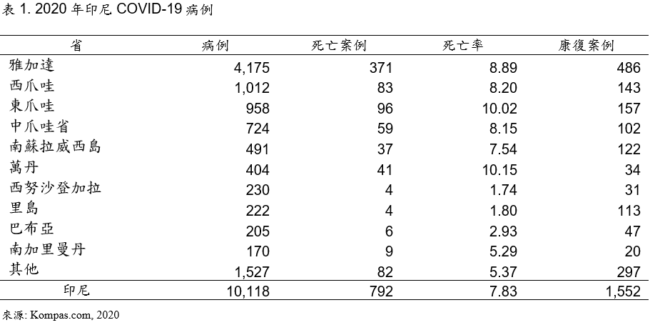Indonesia's Agricultural Policy in response to the COVID-19 epidemic and suggestions for Taiwan's Agricultural Strategic Development
0 sharing


Asia-Pacific Food and Fertilizer Technology Center Agricultural Policy Information platform Translation [1]
Preface
The recent pandemic of COVID-19 (Coronavirus Disease 2019, COVID-19) in the world also poses a threat to public health in Indonesia. The epidemic of COVID-19 represents a significant increase in the number of cases and deaths, and spreads among countries. At the same time, it also has a direct or indirect impact on Indonesia's political, economic, social, cultural, national defense and security, as well as community welfare.
COVID-19 also significantly hinders economic activity and seriously affects the economies of most countries. This epidemic can lead to situations that require special prevention. As a result, the Indonesian government has issued several regulations, such as Government Regulation No. 1 / 2020, Presidential decree No. 11 / 2020, and Government Regulation No. 21 / 2020. One of the striking policies is to impose large-scale social activity restrictions on certain activities in areas with suspected or infected cases, in order to prevent the wider spread of COVID-19. The consideration of this policy takes into account factors such as epidemiology, threat level, effectiveness, resource support, technical operation, politics, economy, society, culture, national defence and security.
This paper discusses Indonesia's main response to COVID-19, focusing on socio-economic policies, that is, large-scale social restrictions and strengthening social protection and economic prevention to face the epidemic. The second half of this article will specifically analyze the impact of this epidemic on the Indonesian agricultural sector.
COVID-19 epidemic situation
COVID-19 is a newly discovered infectious disease caused by coronavirus, which seriously affects the global public health system (WHO, 2020). This epidemic is the first and human disaster, affecting thousands of people and has a growing impact on the global economy. The World Health Organization first declared COVID-19 a world health emergency (WHO, 2020). As of April 30, 2020, COVID-19 has affected 213 countries around the world, with a total of 3090445 confirmed cases and 217769 deaths, including the number of cases still sick (moderate / severe) and removed (recovery / discharge and death). The case fatality rate (Case Fatality Rate, CFR) is 7.04% (Worldometers, 2020).
Indonesia discovered its first case of COVID-19 in the city of Debo (near the border with Jakarta) in early February 2020, and the same cases have been found in Jakarta and other provinces since then. According to official information on April 30, 2020, the total number of cases in Indonesia was 9771, of which 784 (8.02%) died and 1391 recovered smoothly. COVID-19 has spread to 32 of Indonesia's 34 provinces, while East Nusa Tenggara (East Nusa Tenggara) and Gundalo (Goronalo) provinces have not had any cases. The capital Jakarta is the most severe, accounting for 41.88% and 47.19% of the total number of cases and deaths in Indonesia, respectively. Regionally, more than 70 per cent of recorded COVID-19 cases and deaths come from Java (table 1).
From a policy perspective, it is important to know when the epidemic may end. According to the latest forecast from the Singapore driving Innovation Laboratory (Driven Innovation Lab of Singapore), Indonesia's COVID-19 will have three time points, 97 per cent of cases will end on June 7, 2020, 99 per cent of cases will end on June 29, 2020, and 100 per cent of cases will end on September 7, 2020, so the Indonesian government will be vigilant in response to the epidemic at least until September 2020. Many worry that the holiday in late May 2020 will prompt people to return home, raising the risk of the virus spreading from infected cities to rural areas, particularly in Java. Although the Indonesian government has issued laws and regulations to prohibit people from returning home, there will always be fish left out of the net.

- Prev

Care about this dish on the table and go to the place of origin together.
Care about this dish on the table and go to the place of origin together.
- Next

[special report] the large-scale investigation of photoelectric invasion of agriculture directly hit hundreds of cases and exposed four major chaotic phenomena.
[special report] the large-scale investigation of photoelectric invasion of agriculture directly hit hundreds of cases and exposed four major chaotic phenomena.
Related
- A course of planting techniques and methods on how to grow carrots
- How to plant the latest tulips?
- Is it better to pick tea in the morning or in the afternoon? When is the best time for tea to be picked? what is the third or fifth tea?
- Launch Yuanxiao Happy combination Haocha + Tea Yuan healthy Taste
- Penghu Tourism "Fireworks 20 Parade with You"
- 2022 West Lake Happiness holds "Digital Revitalization Voucher" and draws iphone13 and laptop.
- Banqiao Fuzhou social houses are designed to change start-up combined with police elimination to create a safe and livable environment
- The convenient measure of "mechanical weeding" in Xinbei has been abused and the Agriculture Bureau has imposed heavy penalties on the illegal land consolidation.
- Changgeng University Joins Hands with Four Memory Factories to Rescue Memory Talent Shortage
- The list of Taiwan's top 100 MVP managers is listed by the Director-General of the Farmers' Association of Sanxia District.

